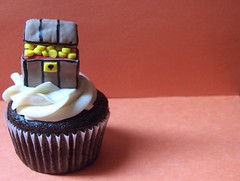Lots of books—especially, it seems, those of a more literary bent—focus on revealing backstory as unlocking a key in a mystery, whether it be finally understanding another person to the character finally discovering the truth about his/her own life. How is that different from “bad” backstory?
The answer may vary, but to me “bad” backstory is a.) delivered up-front in a chunk and/or b.) supposed to totally explain why the characters (especially bad guys and fractured protagonists) are the way they are, and thus justify their poor choices.
“Good” backstory, on the other hand, often isn’t something the main character knows yet. The main  character is searching for the rest of the story right along with us. If a POV character does know the whole story, s/he should have a reason to hide that from the other characters and the reader, instead of just withholding for withholding’s sake.
character is searching for the rest of the story right along with us. If a POV character does know the whole story, s/he should have a reason to hide that from the other characters and the reader, instead of just withholding for withholding’s sake.
This backstory must also be something worth waiting for. The premise of the novel rests on this character’s search for the truth—so that truth had better be worth reading the whole thing for. Trick endings might sell one book, but betrayed readers might be turned off forever.
But most important, perhaps, is what the backstory does. No matter what the specific events of the past or present in the book, discovering the truth should reveal some truth about the present story. It should help the character—and hopefully the reader—make sense of the world, and inform the character in some way greater than just the facts do.
That is, after all, the point of studying history, whether global or personal. We’re trying to understand where we fit in, what came before, and how that can guide us better. We want to know what we believe or feel or know has always been true. We want to know what truth is. And it’s not only the point of studying history—it can be the point of reading fiction, too.
What do you think? What defines the “right” kind of backstory?
Photo by Clever Cupcakes


Great series, Jordan! Backstory is something that I try not to use much. My feeling is that when required it should contain only what is absolutely necessary to get the reader through a particular scene… a “need to know” thing. I don’t like to read “info dumps” and I don’t want to write them, but sometimes a scene makes no sense if the reader doesn’t have at least a hint of what preceded it. (And leaving the reader ignorant of such details until the end of the story doesn’t create suspense for me… just frustration.)
I don’t think we’re talking about the same kind of backstory. It sounds like you’re referring to backstory for character motivations or background information to a scene. We talked about that kind of backstory in the first part of this series, actually.
This “201” part is focused more on the special category of stories where the present story is all about discovering “truth” through discovering the past story. This backstory is more than just information that makes a scene make sense; it changes the entire way the character views the world (maybe we could say that it makes their whole world make more sense). The example I keep using is in The Secret Life of Bees, where Lily is trying to find out the truth about her mother’s death (and her life). It’s been a while since I read it, but if I remember correctly, there are very few instances where we just need the backstory to justify a character’s action in the present. The backstory revelations aren’t incidental to the scene and the characters; when they come, they’re the purpose of the scene and have a big impact on the character and her journey.
I get what was said earlier, but if we define backstory “as any action that takes place before the story starts,” it’s hard to say there is more than one “kind” of backstory. Maybe there are only differences in its purpose and how the writer uses it. Then again, when a past mystery drives a novel, as Andrew mentions, the so-called backstory becomes an integral part of the current action. Maybe it’s just semantics, though. Ignore me… my brain’s frazzled. It’s past my bedtime but it’s too hot to sleep!
Oh, LOL, point taken. I guess it’s better called a difference in the type of story itself, not backstory.
My whole novel hinges on mysteries and secrets from the past.
It’s an alternate history—what made history change?
My MC meets her identical twin she never knew about…it’s backstory begging to be uncovered.
Oh…and I agree about not waiting ’til the end to reveal it. I did that in my first draft, and in my revision I discovered that the revelations had a much bigger impact revealed earlier….because the characters must then deal with the consequences for a large part of the book.
Oh, that’s a great point!